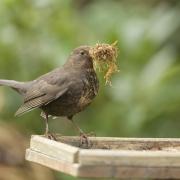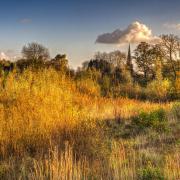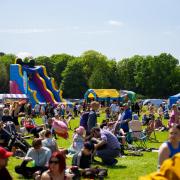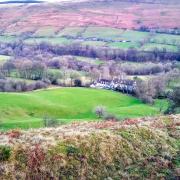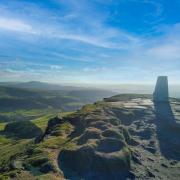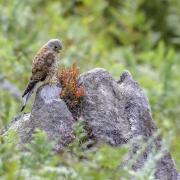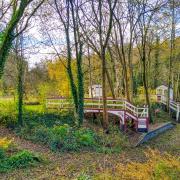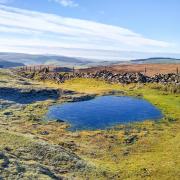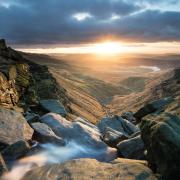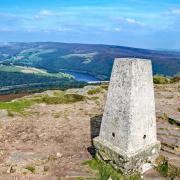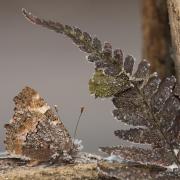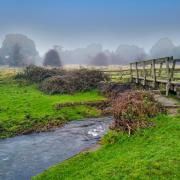Two years later they would play to over 55,000 fans at Shea Stadium. Yet on a magical evening in 1963, the Beatles belonged to Buxton.

For those who’d been lucky enough to be there, it was an evening that would be imprinted in their memories forever.
They would become the biggest band in the world but at the very cusp of their stellar career the Beatles played a sell-out gig at Buxton’s Pavilion Gardens, on April 6th 1963.
‘When I tell younger people I saw the Beatles play in Buxton they don’t believe it,’ says former Cavendish Grammar School pupil, Judith Vale (nee Brown).
‘But it’s true. I was just 16 at that time and to be honest we didn’t realise how significant it would be, as a lot of the up-and-coming groups came to the Octagon at the Pavilion Gardens every Saturday. It wasn’t until later when people said ‘did you really see the Beatles in Buxton?’ that you realised just how important it was.’
At the time, the Beatles had just released two singles, Love Me Do and Please Please Me. Ernie Sutton, Treasurer of the British Beatles Fan Club (BBFC) explains: ‘Their first album Please Please Me had been released a couple of weeks earlier and their set, which ran for around 30 minutes, consisted mainly of songs from the album.’
The band had famously toured Hamburg in 1960 and before heading to Buxton in 1963 had shared the stage with Helen Shapiro and toured with Tommy Roe and Chris Montez. At Buxton, the support was a band called the Trixons, a Beatlesesque seven-piece, who have since faded into obscurity.
Continues Ernie: ‘Brian Epstein, their manager, organised the tour. With Beatlemania not yet in full swing he wanted them to play as many gigs as possible so they could gain success in the UK.
‘Later in April the single From Me To You was released in England, which became their first number one single, then Beatlemania really exploded in England in late Autumn 1963 following their return from Sweden.

‘From this point, their tour venues became larger and the following year they would tour the USA, Europe, Australia and New Zealand.’
For Beatles fans like Judy, who would never again have the chance to see the Fab Four in such intimate surroundings, this was a life-changing experience.
‘I was at school at the time and I had to ask my parents’ permission,’ she recalls.
That took quite a while and a lot of persuasion before they said I could go, as I also wanted to take a new boyfriend, although that boyfriend is now my husband and we’ve been married 49 years,’ she laughs.

One of her prized possessions is a picture from the Buxton Advertiser in which she and her now husband Brian can be seen standing against one of the four pillars which held up the Octagon roof.
‘What I remember is it was absolutely packed,’ she says. ‘We forced ourselves through the crowds getting right to the front. I had my back to a pillar, so I wasn’t being pushed about, but there was an incredible crush at the front. People just surged forward. There was no area in front like there is today at venues like the O2, with security and police in it, and people were right up to the stage.
‘The police were there and they were literally lifting girls out who were getting squashed at the front. It was phenomenal, It’s only now you go ‘wow’. People don’t believe me when I say the Beatles came to Buxton, so I get the newspaper picture out to prove it.’
One person who wasn’t so thrilled by the moptops’ Buxton debut was Trevor Gilman who, as a 19-year-old apprentice engineer, had gone to the gig to see what all the fuss was about.
‘I’d heard of these people. I’m not saying I was particularly enamoured,’ says Trevor, who was more into the big band dance scene of the era.
‘I went along with my mates. It was standing room only and there were about 2,000 people there. There’s no way they’d allow those numbers today. Everybody was trying to get to the front, all the girls were screaming, so you couldn’t hear a lot.
‘The story goes that when the girls at the front fainted they were pulled up on stage and taken to the dressing rooms and other girls cottoned onto the fact they’d gone backstage and promptly followed suit!’
Judy Mackay (nee Harrison), also a 16-year-old student at Cavendish School, went with a group of friends, including future husband Roderick, a 17-year old student at Buxton College.
She recalls dressing in a ‘uniform’ of black polo neck, an above the knee denim skirt, with a wide Alice band in her hair.
‘I was probably in the fifth form at Cavendish. I think the shake (dance) had just come in then. That was what you did to their music and then dancing evolved into more free expression.
‘The change was phenomenal from people dancing with a partner to everyone dancing on their own. Before that the girl would wait for the lads to ask them to dance.’
On the night, she witnessed a packed concert hall and hordes of screaming girls and while she’d already seen bands such as Gerry and the Pacemakers, Freddie and the Dreamers and the Moody Blues, who had previously played the venue, this was on another level.
‘I think that was what was so fantastic about it because it was totally new,’ says Judy.
‘I had an older brother and sister with only five years between me and the oldest but I was another generation and into different music. My brother was more into jazz and jiving. My sister was 19 and thought the new music was a load of rubbish. Elvis was her thing. I think that’s why Beatlemania was such a huge phenomena, because they hit an age group that was younger. After all they were just young lads themselves at the time.
‘We reacted that way because we were mad, hormonal teenagers. It was nothing to do with drink or anything like that, there was no alcohol at the Octagon, it was just the music and it was a complete liberation.
‘I loved the Beatles. I still love them. When I hear them now I think that was my music. They were good and they are still good. I hear the music and still find myself dancing.’
Tickets had to be bought on the day, so there were inevitably some fans that were disappointed, like Sue Stones who now runs the Bakewell Youth Theatre.
Sue had been a fan from early on but was unable to get the hottest ticket around. Undeterred, she was one of a group of girls who were convinced John, Paul, George and Ringo were staying at Bakewell’s Rutland Hotel.
‘I was about 14 at the time. There were about 40 of us, all these dishevelled-looking girls shouting ‘we want the Beatles, we want the Beatles.’ We were adamant that they were staying there,’ she says.
‘I remember, we were so disruptive, the police were called. Later, I wrote a play called Puddings not Tarts and it involved researching the Militia Acts riot of 1796 which, funnily enough, began with a meeting at the Rutland Hotel - so our claim to fame was as the second ever Bakewell riot!’
The Beatles would go on to play Buxton one final time later in the year. By then, the band’s era of intimate gigs was coming to an end, as they were catapaulted to worldwide fame. The rest, as they say, is history.
At the scout camp
It is believed that right at the start of the Beatles’ remarkable journey to wordwide, enduring fame, Paul McCartney actually missed the first arranged gig with John Lennon and the Quarrymen (the name of the band before they settled on The Beatles) because he was on a Scouts Camp in rural Derbyshire.
The gig was at the now world famous Cavern Club, in Liverpool, on 7th August 1957. However Paul, along with his brother, were 65 miles away in Hathersage, in Hope Valley, Derbyshire.
Far from being a fleeting memory of Paul’s, he references the Derbyshire trip in his 2008 Grammy nominated song That Was Me.
In it, Paul takes a nostalgic look back at various points from his life. ‘That was me, at the Scout camp’ he sings in the first line.
Who would have thought Hathersage would be referenced in a Paul McCartney song.




